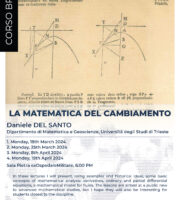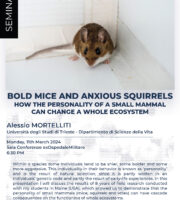Archivio Corsi e Conferenze
Conferenze e corsi passati

18/03/2024
LA MATEMATICA DEL CAMBIAMENTO • Short Course by Daniele Del Santo – Starting on Monday, 18th March 2024
Short-course by professor Daniele Del Santo, Department of Mathematics, Informatics and Geosciences, University of Trieste.

11/03/2024
BOLD MICE AND ANXIOUS SQUIRRELS • Seminar by Alessio Mortelliti – Monday, 11th March 2024
How the personality of a small mammal can change a whole ecosystem.

01/03/2024
MODULE 4: PRESENTING IN ENGLISH • Advance English Course by John Daer – Starting on Friday, 8th March 2024
Oral presentation skills: slide preparation, delivery.


